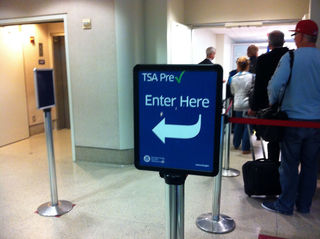Empathy
Why TSA Agents Need Therapy Skills Training
Trainings in empathy and compassion could go a long way at the airport.
Posted September 24, 2016
It wasn’t too long ago that I entered the airport still sleepy-eyed from my 4am wakeup for our travel back East. Despite the frenzy everywhere, I remained calm knowing that I’d gone through the process of applying for Global Entry, one of the four ways of becoming eligible for TSA Pre-Check. I recall moving around clients on my therapy schedule for the pure purpose of securing a time for the interview process as they were booked out months in advance.
Fast forward to standing in the pre-check line with my online boarding pass and getting up to the front of the line only to have the formerly jovial TSA agent narrow his gaze at me (clearly I had just committed a crime!) and inform me that I was not pre-checked and would have to go back into the other line that was now zigzagging what felt like a mile away. Panic started to creep in as we were boarding in 20 minutes, the line next door was definitely looking more like a 40 minute commitment, and the agent was not having it. “I have my Global Entry card right here,” I said and showed it to him (this was me using my former over-achiever ways from back in school because who thought to bring the card with them, right?). “Global Entry is not the same thing as TSA,” he retorted.

Yes, but it’s a way of accessing Pre-Check and you pay for both at the same time. It costs more, and frankly I’d think international standards would be higher, hence being a no-brainer. It’s like having a Master’s degree and demanding a Bachelor’s degree diploma, I rationalized. In any case, the logic was lost on him because frankly no little check mark icon = no entry. It reminded me of all the conversations I have with my clients about cognitive thought distortions and the perils of black and white thinking. There are always shades of grey I explain to them. I finally looked him square in the eye and said the flight was boarding in twenty minutes, the line would take forever and I’d miss my flight. He said the best he could do was send me to the employee express line. Tell them the supervisor said it was ok, he advised. And so off I was on my wild goose chase as the minutes ticked by.
I quickly rushed in to the express line, smiled and greeted the woman at the line. She immediately grumbled and said I was not allowed to enter the line. I explained the situation and her colleague sending me over, but she did not care. I asked her what I could do, what my options were, but it was all lost on her. Black and white. You are not an employee. You cannot enter. At that point, I was on the verge of tears in a very public setting (which is about as rare as seeing the aurora borealis from my backyard). As I tried to figure out where to go and what to do, the woman became more and more upset and was now yelling at me. As I was attempting to leave, she literally followed me just to tell me I’m an extremely rude person (for what, having emotions, being flustered, being cognizant of time constraints?)
My husband witnessing all of this from the long line beckoned me to come toward him and for the first time in my life, I nearly lost it right there in the airport. And I have had some pretty ridiculous flight stories (a plane not departing due to lawn mowers blocking the field, waiting for the glue to dry on an airplane window, you get the picture). But that day, everything was a mess from the beginning. From the women at the Alaska line who offered no assistance other than to watch us and scold us for entering the baggage drop line without tagging our bags first (the tags were literally in our hand, and a line was already there, hence giving us time to do so- never mind the fact that they did not bother getting their own hands dirty to help) to the aggressive woman at the employee line, it was terrible. If this was how this trip was starting, how much better could it get? We were being treated like cattle, herded, poked, prodded, literally. After all, if you refuse the radiation machine that x-rays your body, you are subject to a fairly invasive pat down.
Since when did we sanction such treatment? While airlines can vie for your business by offering more leg room or better treats, TSA doesn’t have to do anything. Airports are not privately owned. Instead, they inspire a police-state fear in passengers to keep them from questioning authority. No wonder a business traveler once stripped down to his underwear in protest at the Portland Airport. Although it is regularly ranked as the number one airport in the country, my encounter also occurred in Portland.
As my husband and I decided to walk away from TSA and their absolute nonsense, my husband went to gather names and badge numbers of the employees involved in this debacle. We learned angry line lady is Kay and she is not employed by the Portland airport or TSA. She is hired by a third party contractor with a job description whose purpose is one thing: to keep people out of line. A very noble and helpful calling indeed. The gentleman who sent me to the express line conveniently disappeared by the time we decided we were no longer interested in flying.
Perhaps what made this whole scenario so upsetting was the complete disregard for human emotion or compassion. In the past, when fliers were at risk of missing flights, agents would call up to move folks ahead in line. I’ve been to airports where they randomly open up lines and send folks through metal detectors only to speed things along. Instead, at the Portland Airport, there was a lot of yelling about liquids and laptops, sternness everywhere and no intent to help. In fact, the most helpful folks were those that helped us pull our luggage off the flight and the employees at the baggage carousel who delivered them to us. They had kindness and even concern in their eyes when they saw we had canceled our itinerary. But unfortunately it was too late by then.
The truth is, much can be done to ameliorate the procedures completed at the airport. Instead of having someone standing around yelling in a jarring manner, you can use electronic screens more consistently to flash reminders (and heck, less money to pay an actual human). You can teach employees to recognize the critical difference between anxiety and anger that Kay missed. She interpreted my panic as aggression toward her when I never once misspoke to her in any way. Airports can learn better communication across their own employees. If a supervisor advises a passenger one thing, they should not then be redirected again. Otherwise, it appears the supervisor lied. Much can be done to better equip TSA and airport personnel to help decompress what is now a highly stressful process for millions of travelers. Though research shows time and again that many potentially hazardous items are missed in screening despite the ridiculous procedures we are asked to endure, even those procedures can be better executed.

At what point will all this stop? For now, my husband and I are engaging in our own form of protest. Despite the time I put in to ease travel through Global Entry, we are putting flying aside for some time to the extent that is possible. We will go as far as our cars can take us because once we open up the possibility of flying, our basic human rights are being taken away. It is as Benjamin Franklin stated, “They who can give up essential liberty to obtain a little temporary safety deserve neither liberty nor safety.” This quote was incidentally at the end of a video posted by former Miss USA Susie Castillo back in 2011 when she was in tears at the Dallas airport after feeling she was molested by TSA agents in a pat down. Here we are, five years later and nothing seems to be changing.
Perhaps this article will make a difference, although most likely it won’t. Pretty soon we’ll have retina scans and fingerprinting right there in the airport. But maybe, just maybe, airports across the country can stop for a moment and consider the human aspect of things. Perhaps they will employ human behavior experts, psychologists and mediators to help their employees develop skills that are desperately lacking. Maybe there will be less shouting and stern looks, and instead more kindness and compassion.
Follow me on Twitter at MillenialMedia and share your TSA encounters.




